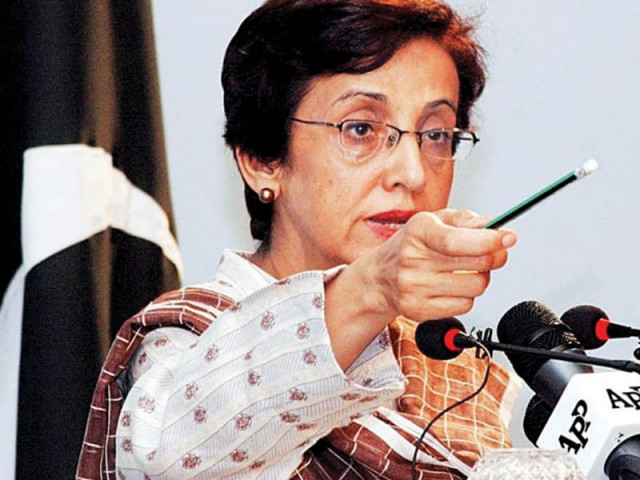Pakistan reaches out to envoys on INGOs policy
Tehmina Janjua says cancellation of registration and closure is in compliance with the standards of due process

PHOTO: FILE
Foreign Secretary Tehmina Janjua gave a detailed briefing to the envoys here on Wednesday, "as part of the outreach to discuss questions and mutual concerns related to registration and operation of INGOs in Pakistan," said an official handout.
Senior representatives of Ministries of Foreign Affairs, Interior and Economic Affairs Division (EAD) also attended.
Outlining Pakistan's approach and policy, the Foreign Secretary reaffirmed Pakistan's commitment to a mutually beneficial framework on INGOs, underpinned by rule of law, transparency and responsive to nationally determined development priorities.
Govt shows door to 18 INGOs over failure to comply with rules
The Foreign Secretary further noted that the policy framework was guided by Pakistan's national context, circumstances, needs and priorities.
The briefing was arranged against the backdrop of government's move to cancel the registration of several INGOs in October last year. Authorities had ordered those INGOs to wind up their operations in
Pakistan apparently on the pretext of working against the country's national interest.
The issue came up for discussion during Wednesday's briefing when some participants asked questions about the move.
Defending the decision, the Foreign Secretary insisted that cancellation of registration and closure was in full accord with the standards of due process, noting that the right of appeal and opportunity to discuss mutual concerns was provided to the INGOs.
Responding to concerns over potential impact of cancellation decision on the people of Pakistan, the Foreign Secretary underscored that 74 INGOs were operating freely in the country and contributing in several areas of priority to Pakistan.
Regarding suggestions for flexibility and periodic review, it was highlighted that the inter-agency mechanism had further delineated the scope of activities that are responsive to Pakistan's national development priorities.
She encouraged the INGOs and donor governments to work in areas such as poverty alleviation, health, vocational education and training, science and technology, environmental protection, disaster management, sports and culture.
The envoys expressed gratitude for the open dialogue and constructive spirit to discuss mutual concerns. Both sides agreed to remain engaged with a view to improving communications and finding ways to address concerns.
Science Diplomacy
Meanwhile, Foreign Minister Shah Mehmood Qureshi inaugurated the first high-level Inter Agency meeting on "Science Diplomacy". This initiative was launched in September last year with the designation of a focal point (Science Diplomacy Division) to act as a liaison between national S&T stakeholders and international partners.
Welcoming the participants of the meeting, Foreign Minister outlined the main contours of the Science Diplomacy initiative which included building constructive international partnerships in science and technology and to deal effectively with trans-boundary challenges such as climate, energy, water, poverty reduction, health and education.
The initiative would focus on establishing international research collaborations, capacity building, improving public health, matching labour skills with international market requirements and to improve Pakistan's access to smart technologies and international technical assistance, especially in the context of the implementation of the SDGs (Sustainable Development Goals).
Foreign Secretary in her remarks highlighted the fact that the idea of using science as an instrument for Diplomacy was not new. This was being actively pursued by many countries as a vital tool of foreign policy
The important role of relevant ministries, government departments, educational institutions and private sector entities in international collaborations in Science and Technology was underscored.
Foreign Office hoped to act as a catalyst for all such endeavours in line with the national development priorities and S&T policies and strategies.
Science Diplomacy initiative would also facilitate the work of the National Knowledge Economy Task Force headed by the Prime Minister especially in the context of international collaborations.
Dr. Tariq Banuri (Chairman) Higher Education Commission, Dr. Yusuf Zafar (Chairman) Pakistan Agricultural Research Council (PARC), Prof. Dr. Iqbal Chaudhry (Director HEJ institute) University of Karachi, Brig. Dr. Aamer Ikram (Executive Director) National Institute of Health Islamabad, Dr. Erum Khan, (Chair of Institutional Biosafety Committee) Aga Khan University and Dr. Nasir Khan (Executive Director) National Vocational and Technical Training Commission (NAVTTTC) presented proposals in their areas of expertise outlining possible avenues for international cooperation and the role of Ministry of Foreign Affairs in this context.
The meeting was attended by senior representatives from both public and private sector dealing with health, education, science and technology, energy, climate change, food security, industries and SDGs.



















COMMENTS
Comments are moderated and generally will be posted if they are on-topic and not abusive.
For more information, please see our Comments FAQ